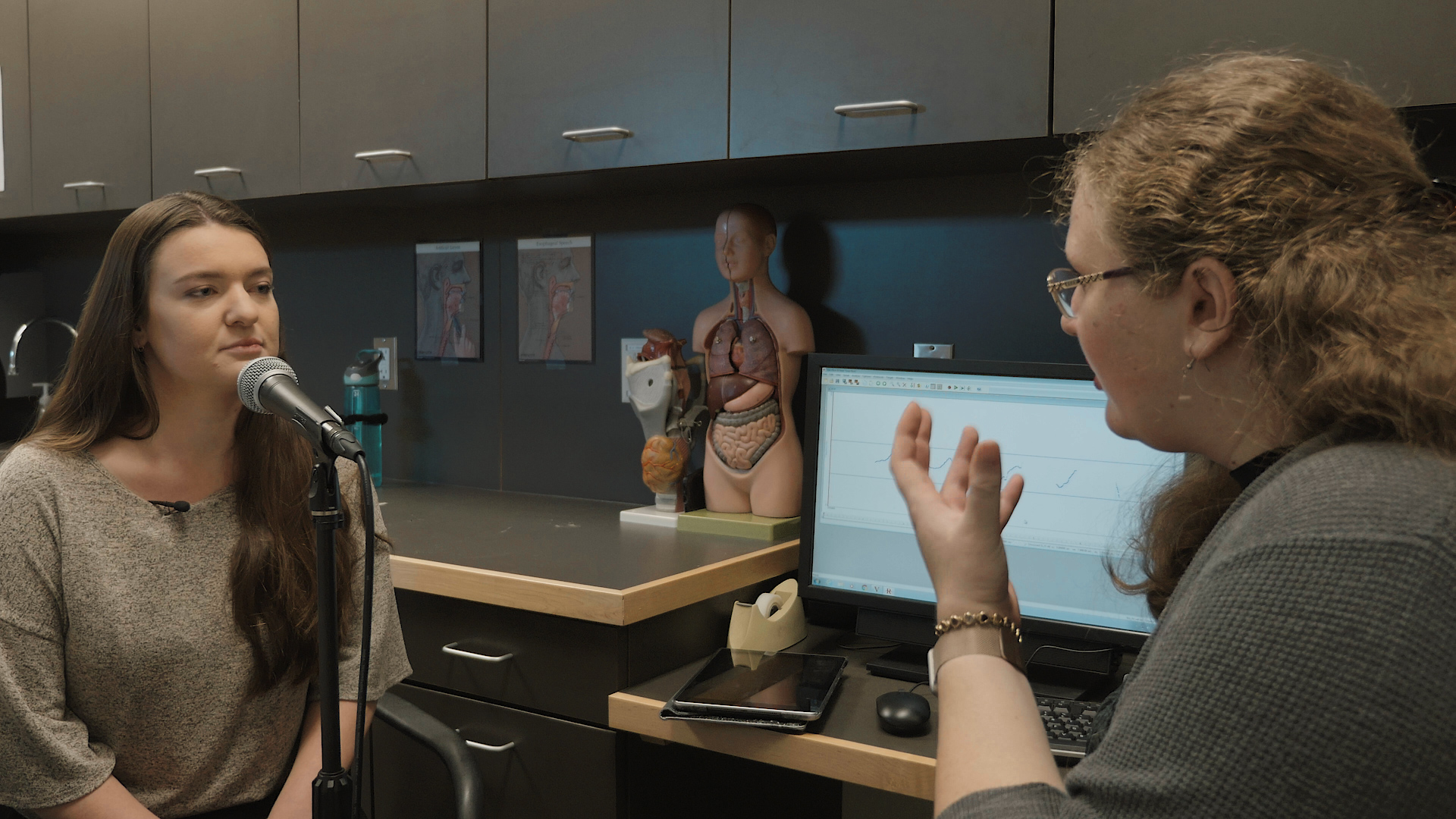ASU clinic hopes to offer safety, confidence with transgender voice therapy

At first glance, you might think Arizona State University grad student Abby Goff is in need of a sweater. Vibrating her lips as she breathes out slowly, the universal sound of one chilled to the bone fills the room: “Brrr!”
In actuality, Goff is demonstrating a lip trill. As a student clinician at the College of Health Solutions' Speech and Hearing Clinic, it’s one of the exercises she teaches clients as part of transgender voice and communication therapy, one of the many services offered by the clinic.
Film and media production undergrad Julie Tjalas, one of the six transgender clients the clinic has served since it began offering the specialized therapy over the summer, says training her voice to match her gender identityAverage feminine voice pitch is considered 155-245 Hz. The average masculine voice pitch is 85-180 Hz. A range of 150-185 Hz is considered "gender acceptable" for a transgender woman's voice. is partly about self-confidence and partly about safety.
“I like having control of who knows whether or not I’m trans,” she said. “I don’t mind if people think I’m cis unless I tell them otherwise. If I can have that layer of control, I feel safer, because not everyone has positive opinions about trans people.”
Tjalas’ comment is underscored by the observation Tuesday of the international Transgender Day of Remembrance, which draws attention to the continued violence endured by the transgender community and memorializes those who have been victims of it.
Clinic director Myra Schatzki said transgender women sometimes try to train their voice on their own, which can be harmful.
“If they are trying to strain to reach a certain pitch range, which is much higher than a masculine pitch range, and trying to sustain that over a period of time without using proper breath support, they can definitely begin to develop a pathology,” such as strained muscles and hoarseness or loss of voice, she said.
(Voice isn’t usually as much of an issue for transgender men because of testosterone treatments.)
The Speech and Hearing Clinic’s transgender voice and communication therapy program is designed to help patients achieve their goals incrementally, focusing on maintaining a healthy voice along the way.
After an initial vocal health assessment that determines a client’s baseline pitch and sets out a plan of action, clients visit the clinic for a 50-minute session with a graduate student clinician once a week, for 10 weeks each semester.
At any given session, clients might find themselves humming along with a keyboard to match a certain note, reading sound charts into a microphone while computer software tracks their pitch range, or performing relaxation techniques — including those lip trills.
The graduate student clinicians tailor each session based on individual clients’ needs, backing every lesson plan up with evidence-based research.
Goff and fellow grad student clinician Rebecca Abraham agree it’s experience they wouldn’t be getting anywhere else and are happy to see transgender voice therapy becoming a more recognized facet of the speech and hearing field.
Grad student clinicians Abby Goff (left) and Rebecca Abraham work on therapy techniques at the College of Health Solutions' Speech and Hearing Clinic. Photo by Jamie Ell/ASU Now
“Being able to speak at a pitch that accurately represents your gender is something a lot of us take for granted,” Abraham said.
But voice is way more than just pitch, they’ve learned. There’s also resonance, intonation, body language and more.
“We're trying to look at the whole package,” Goff said. “Not just the sound of your voice but the way you use it — the way you use your body when you're communicating. Every aspect of communication, we're trying to target. The goal is for the client to be able to integrate all of that for a sustained time, without any concentration and without straining their voice.”
And in addition to learning more clinical fundamentals, such as how to develop a plan of care and document client progress using an electronic medical record, the students learn “how all clients deserve to receive proper care with dignity,” Schatzki said.
In just the few short months since she began treatment in September, Tjalas has noticed improvements that have made a big difference in her life.
“It’s something that makes me feel better about myself,” she said. “It might feel goofy at first, but it’s sort of like a drama or theater class. After you get over the initial awkward curve, you get use to making weird sounds on a weekly basis, and it becomes fun. And it’s a very positive and welcoming environment.”
Anyone interested in the College of Health Solutions' Speech and Hearing Clinic transgender voice and communication therapy should contact the clinic at 480-965-2373 to schedule an initial evaluation appointment. The clinic offers accessible prices and accepts most major insurance plans.
Video by Jamie Ell/ASU Now
More Arts, humanities and education

Kaleidoscope short film contest inspires powerful binational filmmaking in its second year
“We come to this country not to steal anybody’s jobs but to take advantage of the opportunities that the rest ignore. We’ve been taking care of the American soil for many years. But our hands will…

School of Social Transformation faculty member assumes new title with NSF
School of Social Transformation faculty member and Founding Executive Director of the Center for Gender Equity in Science and Technology (CGEST) Kimberly Scott is accepting a new position…

ASU's Neal Lester reflects on life, death of poet Nikki Giovanni
When Neal Lester heard on Monday that poet and activist Nikki Giovanni had died, the news hit hard.Lester, the founding director of Arizona State University’s Project Humanities and a Foundation…
